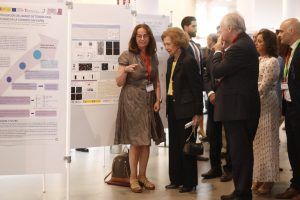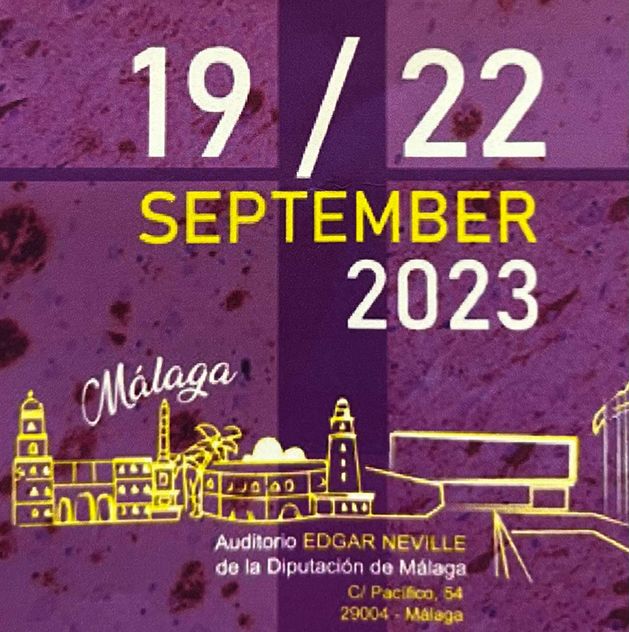MÁLAGA / Septembre 19, 20, 21 and 22, 2023
Researchers from the Healthy Architecture & City research group of the School of Architecture of the University of Seville present the progress of their research at the International Congress of Neurodegenerative Diseases, organised by the Reina Sofia Foundation, the Neurological Diseases Research Centre Foundation, the Institute of Health Carlos III, the Biomedical Research Centre in the Neurodegenerative Diseases network, and, this year, for the first time, by the Spanish Society of Neurology. The City Council and the Malaga Provincial Council collaborate by making the Edgar Neville Auditorium and other resources to support the Congress available.
 The work presented in poster form by the Healthy Architecture & City group is titled Spatial adaptation of the living environment for people with Alzheimer’s: advance results for a manual of good practices, and its objective is to present the advances obtained in architectural and technological research aimed at designing, adapting, and building spaces, environments, and domestic areas for users with Alzheimer’s disease (AD).
The work presented in poster form by the Healthy Architecture & City group is titled Spatial adaptation of the living environment for people with Alzheimer’s: advance results for a manual of good practices, and its objective is to present the advances obtained in architectural and technological research aimed at designing, adapting, and building spaces, environments, and domestic areas for users with Alzheimer’s disease (AD).
The objective of the work is to increase safety, accessibility, and autonomy in the home environments of these patients in order to increase their quality of life, both for them and their carers and/or family members. The physical space, its morphological dimension, its functions, and its environmental connotations can facilitate orientation, stimulate memory, contain fear, or reduce the feeling of frustration. This interaction occurs through physiological or cognitive stimuli that people affected by AD perceive in the physical space they inhabit.
The poster presents a series of works focused on the definition of design guidelines to build an adequate environment that improves the Instrumental Activities of Daily Living (IADL) of these users. The presentation of the progress of the results obtained so far is an opportunity to present a manual of practical solutions while also showing what elements and spatial aspects are necessary to incorporate in facilities such as a hospital or a residence intended for this group of people.
 This is a field of work that is very little addressed in the study of neurogenerative diseases, despite the fact that, from neuroarchitecture, there has been substantial progress in recent years in housing improvements aimed at the population with dementia and, in particular, for this group with Alzheimer disease. This line of research has been developed since 2016 under the title Designing for the Absence of Memory by the Healthy Architecture & City group, in collaboration with the Basic and Applied Neuroscience line of the Faculty of Medicine of the University of Malaga. It includes several research projects developed by researchers from both groups.
This is a field of work that is very little addressed in the study of neurogenerative diseases, despite the fact that, from neuroarchitecture, there has been substantial progress in recent years in housing improvements aimed at the population with dementia and, in particular, for this group with Alzheimer disease. This line of research has been developed since 2016 under the title Designing for the Absence of Memory by the Healthy Architecture & City group, in collaboration with the Basic and Applied Neuroscience line of the Faculty of Medicine of the University of Malaga. It includes several research projects developed by researchers from both groups.
The International Congress of Neurodegenerative Diseases is held for another year under the presidency of H.M. Reina Sofía and returns to its usual date of September 19 to 22 to coincide with and celebrate International Alzheimer’s Day.
Like every year, this scientific Congress aims to bring society closer to the advances in research in the fight against Alzheimer’s and other neurodegenerative diseases and, above all, to raise the evident need to advance in the search for global solutions and answers due to their social consequences.
The International Congress of Neurodegenerative Diseases focuses on advances in research in neurodegenerative disorders. It provides a forum to discuss a variety of areas of interest related to the basic, clinical, and translational aspects of neurodegenerative disease research, providing researchers from around the world with opportunities to discuss and share experiences and entertain topics that extend into the future. and it will be vital to achieve progress in the knowledge and treatment of these diseases.
Researchers from several countries, such as Rik Ossenkoppele (University of Amsterdam), Jorge Sepulcre (Harvard University), Nick Ashton (University of Gothenburg), and Alberto Lleó (Hospital Santa Creu i Sant Pau-CIBERNED), participate in the congress. Dr. Jean-Charles Lambert (Institut Pasteur de Lille) will give the keynote lecture.



